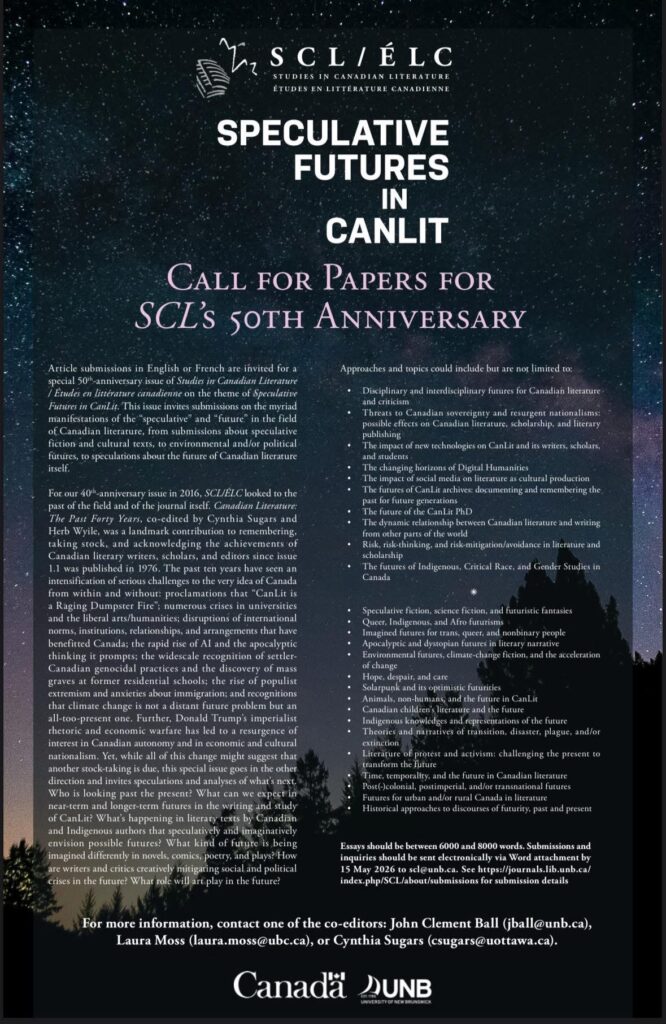Call For Papers for a special issue of Studies in Canadian Literature on “Speculative Futures in Canadian Literature.”
Speculative Futures in CanLit
Call for Papers
Article submissions in English or French are invited for a special 50th-anniversary issue of Studies in Canadian Literature / Études en littérature canadienne on the theme of Speculative Futures in CanLit. The issue will be co-edited by John Clement Ball, Laura Moss, and Cynthia Sugars, and with a submission deadline of 15 May 2026.
This issue invites submissions on the myriad manifestations of the “speculative” and “future” in the field of Canadian literature, from submissions about speculative fiction and cultural texts, to environmental and/or political futures, to speculations about the future of Canadian literature itself.
For our 40th-anniversary issue in 2016, SCL/ÉLC looked to the past of the field and of the journal itself. Canadian Literature: The Past Forty Years, co-edited by Cynthia Sugars and Herb Wyile, was a landmark contribution to remembering, taking stock, and acknowledging the achievements of Canadian literary writers, scholars, and editors since issue 1.1 was published in 1976. The past ten years have seen an intensification of serious challenges to the very idea of Canada from within and without: proclamations that “CanLit is a Raging Dumpster Fire”; numerous crises in universities and the liberal arts/humanities; disruptions of international norms, institutions, relationships, and arrangements that have benefitted Canada; the rapid rise of AI and the apocalyptic thinking it prompts; the widescale recognition of settler-Canadian genocidal practices and the discovery of unmarked graves at former residential schools; the rise of populist extremism and anxieties about immigration; and recognitions that climate change is not a distant future problem but an all-too-present one. Further, Donald Trump’s imperialist rhetoric and economic warfare has led to a resurgence of interest in Canadian autonomy and in economic and cultural nationalism. Yet, while all of this change might suggest that another stock-taking is due, this special issue goes in the other direction and invites speculations and analyses of what’s next. Who is looking past the present? What can we expect in near-term and longer-term futures in the writing and study of CanLit? What’s happening in literary texts by Canadian and Indigenous authors that speculatively and imaginatively envision possible futures? What kind of future is being imagined differently in novels, comics, poetry, and plays? How are writers and critics creatively mitigating social and political crises in the future? What role will art play in the future?
Approaches and topics could include but are not limited to:
- Disciplinary and interdisciplinary futures for Canadian literature and criticism
- Threats to Canadian sovereignty and resurgent nationalisms: possible effects on Canadian literature, scholarship, and literary publishing
- The impact of new technologies on CanLit and its writers, scholars, and students
- The changing horizons of Digital Humanities
- The impact of social media on literature as cultural production
- The futures of CanLit archives: documenting and remembering the past for future generations
- The future of the CanLit PhD
- The dynamic relationship between Canadian literature and writing from other parts of the world
- Risk, risk-thinking, and risk-mitigation/avoidance in literature and scholarship
- The futures of Indigenous, Critical Race, and Gender Studies in Canada
- Speculative fiction, science fiction, and futuristic fantasies
- Queer, Indigenous, and Afro futurisms
- Imagined futures for trans, queer, and nonbinary people
- Apocalyptic and dystopian futures in literary narrative
- Environmental futures, climate-change fiction, and the acceleration of change
- Hope, despair, and care
- Solarpunk and its optimistic futurities
- Animals, non-humans, and the future in CanLit
- Canadian children’s literature and the future
- Indigenous knowledges and representations of the future
- Theories and narratives of transition, disaster, plague, and/or extinction
- Literature of protest and activism: challenging the present to transform the future
- Time, temporality, and the future in Canadian literature
- Post(-)colonial, postimperial, and/or transnational futures
- Futures for urban and/or rural Canada in literature
- Historical approaches to discourses of futurity, past and present
Essays should be between 6000 and 8000 words. Submissions and inquiries should be sent electronically via Word attachment by 15 May 2026 to scl@unb.ca. See https://journals.lib.unb.ca/index.php/SCL/about/submissions for submission details.
For more information, contact one of the co-editors: John Clement Ball (jball@unb.ca), Laura Moss (laura.moss@ubc.ca), or Cynthia Sugars (csugars@uottawa.ca).



